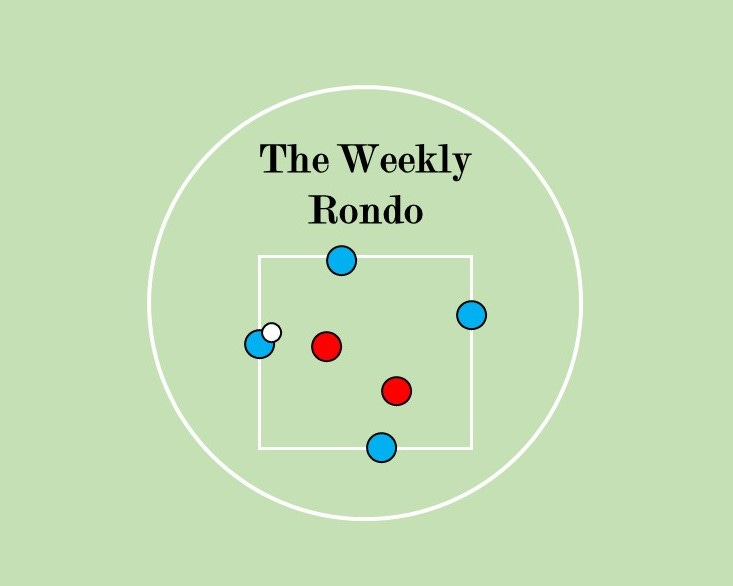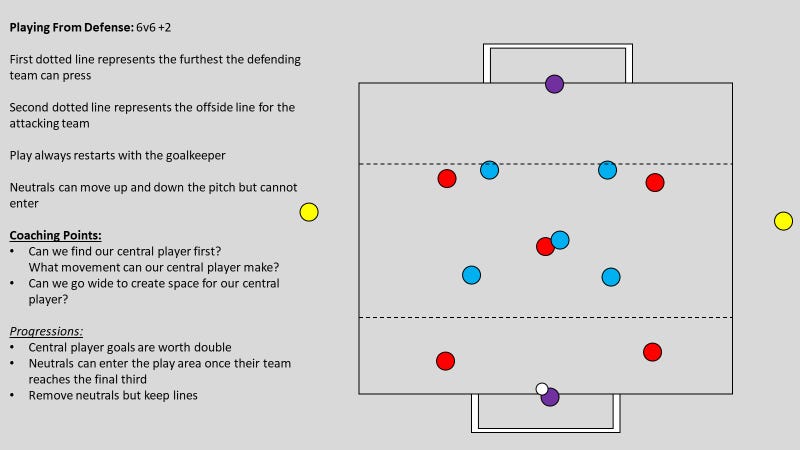Good morning!
Welcome to the first edition of The Weekly Rondo newsletter. Each week I’ll be discussing a different idea related to football coaching or analysis.
I’ll also share podcasts, articles, exercises of the week, resources I find useful, updates from coaching youth international players in Malawi and so much more!
If you want to hear from me each week, subscribe!
To start us off we’ll be talking about playing out from the back.
Neat Reads
Jack McCormack wrote an exciting piece called “ Why Teams Pass to the Goalkeeper During Goal Kicks.” It was about Shakhtar Donetsk and their unique way of playing from defense when Roberto De Zerbi was there.
Exercise of the Week
I used the above exercise in a coaching assessment that I went through at Ascent Soccer in preparation for my UEFA B this December. My boss Marc liked the exercise because it gave the players lots of reps to practice playing from defense and that the progressions were both fun and rewarding to all the players.
Oftentimes neutral players feel left out or lose interest in the exercise because they don’t have anything to play for. They don’t lose and they don’t win. The progression that allows them to enter the play area once the team they're playing for enters the final third and create or score some goals without losing the feeling of match realism.
Coach's Corner:
This will be fleshed out (hopefully!) as the weeks go by. I’m saving it for my ramblings from training sessions this week, as well as a Q & A section.
These questions can be about anything! They can be about style of play, coaching philosophy, favorite theme to coach, etc.
Ramblings:
Malawian players love the short passing game. I see value in it of course, I especially enjoy watching it.
However, this week I lost my mind when I noticed that my players do not know when the short passing style of play is bad.
We were playing a 7v7 game in training to finish the session when the defending team set up with a low line of engagement and a high backline. The most obvious solution is to simply go over the block. However, my players preferred to keep possession and go backwards and sideways.
Some football hipsters may suggest that the short passing game is best and I am not here to entertain that. I am here to develop players that can solve problems and thrive in a changing football environment. A realistic level for our players isn’t the Premier League - they will come across these types of blocks mentioned above in the future.
Is too much short passing bad for development? Are we forgetting to teach our players to be direct when necessary?
Q&A:
What are the biggest differences between Malawian youth players and Canadian youth players?
The Malawian youth player is incredibly technical, small and agile. They can do most things I ask them to do with the ball. They have natural flair from playing possession games on dirt pitches where their first touch and ability to keep the ball is always tested. The downside? Most players never play with a goal. I’ve never seen a natural finisher in Malawi.
The Canadian youth player is faster, stronger and smarter than the Malawian youth player. Canadian players grow up in a stronger education system than their Malawian counterparts. So, decision making is better but execution is poor.
Final thoughts
Thanks for joining me for the first ever newsletter. You’re part of history! I’m always interested to hear your thoughts and ideas so please feel free to send me a message!
As with all things new I’d greatly appreciate it if you shared this newsletter with a friend or every single person you have ever met.
See you next week!
Other ways of finding me:
Medium: https://medium.com/@cameron-herbert
Twitter: https://twitter.com/CamH___
LinkedIn: https://www.linkedin.com/in/cameron-herbert-football-coach/







Learn to do what Napoli do. When opponents press high against them, they play directly with long balls.